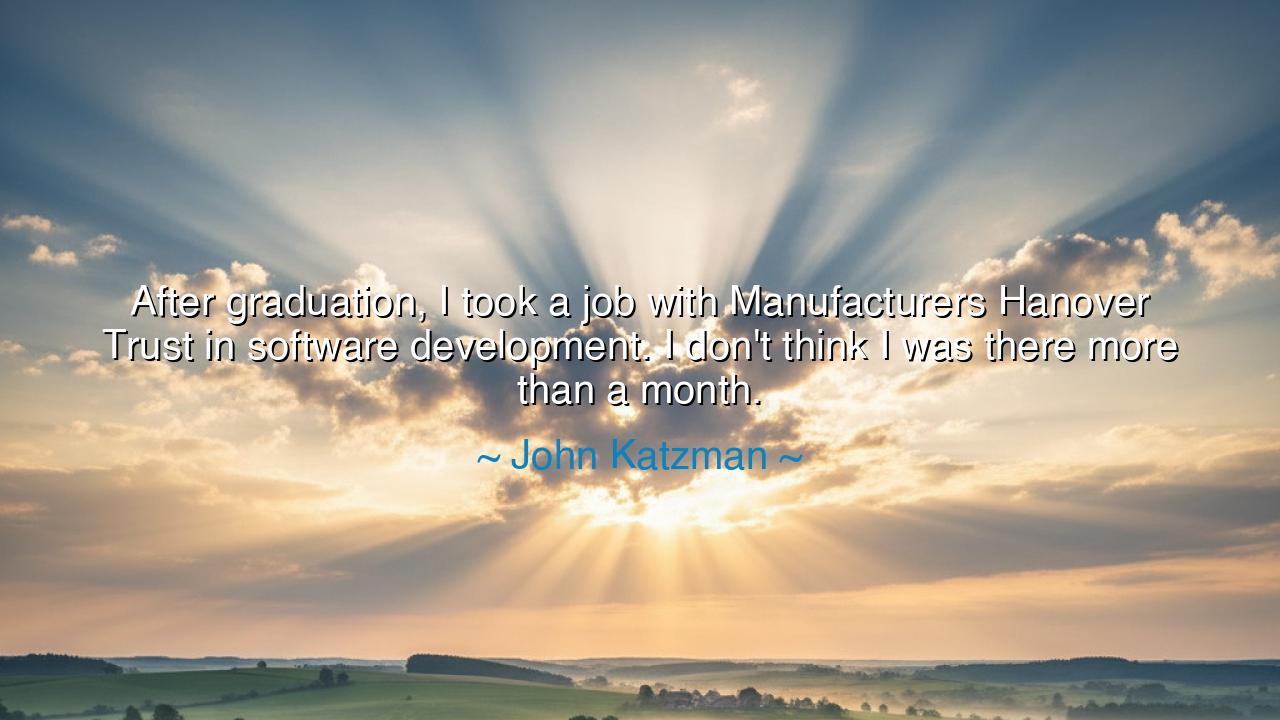
After graduation, I took a job with Manufacturers Hanover Trust
After graduation, I took a job with Manufacturers Hanover Trust in software development. I don't think I was there more than a month.






Hear now the words of John Katzman, spoken with the humility of experience and the insight of a man who learned quickly the difference between work and calling: “After graduation, I took a job with Manufacturers Hanover Trust in software development. I don’t think I was there more than a month.” Though brief and unassuming, these words carry the quiet thunder of awakening — the moment when one realizes that the path chosen is not the path destined. In that short time, between ambition and disillusionment, between conformity and purpose, Katzman discovered a truth known to seekers throughout the ages: that a life lived without alignment to one’s spirit, however stable, will always feel unfinished.
The meaning of this quote lies not in failure, but in revelation. John Katzman, who would go on to found The Princeton Review and reshape modern education, speaks here of his earliest foray into the world — a job taken out of duty, convention, and expectation. Like so many newly graduated souls, he stepped into the current of what the world calls success: a respectable position, a reputable company, and the promise of financial security. Yet within a month, his heart rebelled. The walls of the office, the hum of machines, the routine of programming — they became symbols of confinement rather than achievement. His words do not condemn the profession but confess the misfit between his inner fire and the form his life had temporarily taken. The month he spent there was not wasted; it was the crucible in which he learned what his soul could not bear to settle for.
The origin of these words is both personal and universal. Katzman’s story belongs to a lineage of restless spirits who, upon tasting the stability that society prizes, found it lacking in nourishment. His short tenure at Manufacturers Hanover Trust — one of the great financial institutions of its time — mirrors the timeless journey of the individual who discovers that comfort without purpose is emptiness. From that disquiet came creation: the birth of ideas that would help millions of students find their own paths through education and learning. His departure from that early job was not an act of rebellion; it was the first step toward building something enduring.
Consider, O listener, the tale of Gautama Siddhartha, the prince who lived surrounded by luxury and abundance. Though his palace offered him every pleasure, his heart remained unsatisfied. One day, he stepped beyond its gilded gates and beheld suffering, impermanence, and truth. Within that revelation, he abandoned the comfort of false fulfillment to seek enlightenment — not for himself alone, but for all humanity. In the same spirit, Katzman’s brief month of discontent became the beginning of his greater journey: to create systems of learning that awaken potential rather than suppress it. The prince left the palace; the graduate left the bank. Both sought a truth that lay beyond comfort.
In Katzman’s reflection, there is also a deeper lesson about the nature of vocation. Many begin their lives walking the paths laid before them by others — by parents, teachers, or society’s quiet voice whispering, “This is what success looks like.” But the soul is not bound by the world’s definitions. It will stir, resist, and ache until it finds expression in work that aligns with its essence. A month in the wrong place may teach more than years in the right one, for it clarifies the question: What was I born to do? The wise understand that discomfort is not failure — it is the first sign of awakening.
The lesson in these words is simple yet profound: do not mistake stability for purpose. If the work you do numbs rather than ignites you, if your days pass without passion or curiosity, then you are living not a life, but a rehearsal. John Katzman reminds us that there is honor in leaving what does not serve your calling. To walk away from the wrong path is not to fail — it is to make room for the right one. Life will often offer safe choices; few will offer meaning. The task of every human being is to choose meaning, even when it requires risk, uncertainty, and the courage to begin again.
So, O reader, take this truth into your heart: do not linger too long in places that dim your spirit. Be grateful for every experience, even the ones that disappoint, for they are the mirrors that reveal who you are not. Then, when you know what your heart seeks, pursue it with the devotion of one who has glimpsed the cost of compromise. Like Katzman, may you have the courage to leave the month that stifles you for the lifetime that fulfills you — and in so doing, may you discover that the shortest job can sometimes teach the longest lesson: that your true work is not what you are hired to do, but what you are called to create.






AAdministratorAdministrator
Welcome, honored guests. Please leave a comment, we will respond soon